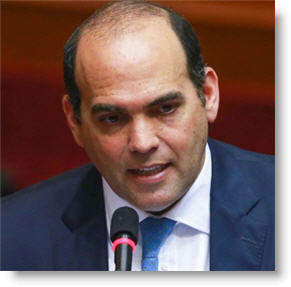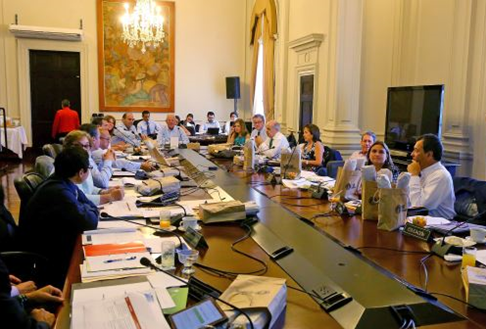 Following on his success Tuesday in Congress with the approval of the Reconstruction Bill, Cabinet chief Fernando Zavala today gave a press conference to present the government’s Electoral Reform bill. The bill proposes a series of changes — including a gender equity quota of candidates in a political party and the return to the bicameral system in Congress— but the main focus is to reduce corruption to a minimum by imposing stringent rules in the whole process of local and national elections.
Following on his success Tuesday in Congress with the approval of the Reconstruction Bill, Cabinet chief Fernando Zavala today gave a press conference to present the government’s Electoral Reform bill. The bill proposes a series of changes — including a gender equity quota of candidates in a political party and the return to the bicameral system in Congress— but the main focus is to reduce corruption to a minimum by imposing stringent rules in the whole process of local and national elections.
“This is a hard reality we need to face firmly,” Zavala said in a press conference. “We need to put the house in order and clean it up to build a new country, which is why the government is giving a series of measures to get rid of this problem, but we know this is not enough, we need to go further.”
The bill has been drawn up between Cabinet members and government’s lawmakers in Congress, and will go before the parliamentary commission that also has proposals from the National Elections Board, JNE, and Transparency.
Full disclosure of financial information will be required by political candidates, from the moment they begin to campaign for internal party elections.

“We have considered that from the moment a citizen decides to be a candidate in the internal elections of a party, that person grants access to the Financial Intelligence Unit, UIF, to their banking, tax and stock exchange information,” said Justice minister Marisol Perez Tello. If the candidate is elected, the UIF will have access to their financial information until two years after they have ended their term in office.
Additionally, anyone convicted at any time of terrorism, illicit drug trafficking, corruption, homicide, kidnapping, sexual assault, crimes against humanity, and fraud against the State are permanently illegible to run for political office.
Measures on campaign financing include limits on individual cash donations, which must be made through the banking system if more than the Tax Unit value (currently S/.4,500), while companies, institutions or foreign governments donating to a campaign must be registered in the country for a minimum of three years prior to making a donation, and failure to do so will mean the political party will be suspended from the election process.
The return to the pre-1992 bicameral Congress system has been discussed by a number of political analysts and parties. The Executive’s proposal is that total number of members of Congress would remain at the current 130, with 100 serving in the House of Representatives and 30 in the Senate. Senators will be required to be at least 45 years old.






Reforms are needed. It is nice to see the initiative. But there are hints of draconian response in some of this, and there may yet be unintended side effects from some of these details. As a good friend, (Peruvian who deeply loves his country) has often said to me, “Peruvians are very clever, Robert – very very clever.” He did not mean this in a positive way. I think it is going to have be a long process of reform to create institutions, to learn to trust those institutions, and to change a way of thinking inherited over a long period of time. However – Adelante! Peruvians are wonderful people and they can, over time, overcome endemic corruption and suspicion.
Given Brazil’s Lava Jato’s, Camargo Correa’s, and Odebrecht’s corrupting forays into Peruvian politics over the pereceding 15 years, perhaps more, it seems absurd to allow foreign goverments, foreign political parties, or foreign companies, to finance political campaigns in Peru, and equally naive to consider reasonable a window of only two years for the State’s Financial Intelligence Unit (UIF) to detect any improper financial gains arising during an elected official’s term in office. Reception of llicit rewards would simply and safely be postponed. Finally, a limiting Congress to only 130 members, however organized, is clearly insufficient to adequately represent 30 million Peruvians, and worse if it is broken down into two chambers, a House of Representatives with 100 members and a Senate with 30, given that the Representatives will each have to stand for 300,000 Peruvians, and overwhelming number for any human being.
I meant “preceding” not pereceding!